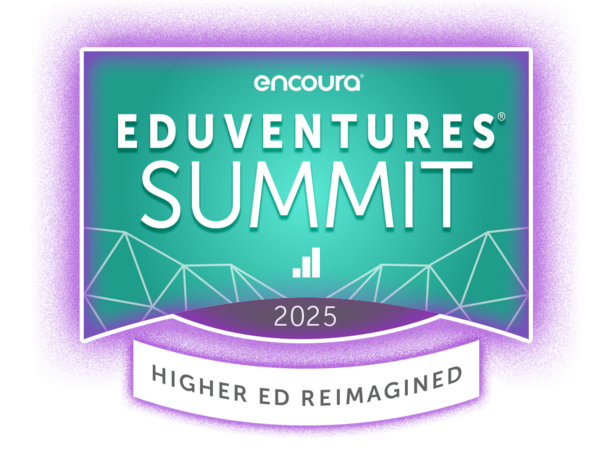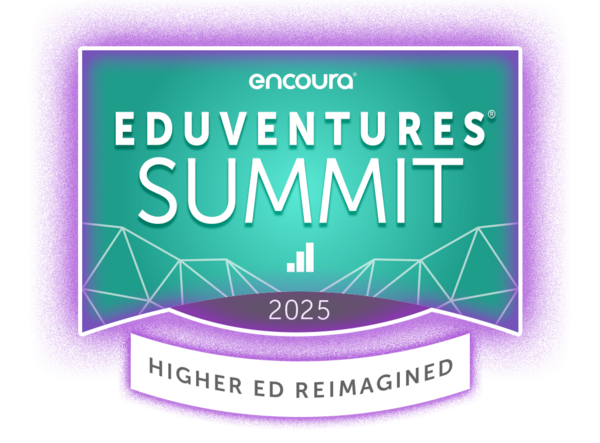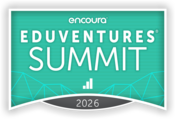
Eduventures Summit 2025
On Demand
Watch the latest insights and research from Eduventures analysts Richard Garrett and Kim Reid; an important fireside chat with Presidents Jeff Stein and Eric Turner; powerful presentations on brand loyalty, alternative credentialling, higher education politics, dignity, gen alpha, and developing tomorrow's leaders; and illuminating panels on the three-year bachelor degree and AI in enrollment.

Eduventures Summit 2025
On Demand
Watch the latest insights and research from Eduventures analysts Richard Garrett and Kim Reid; an inspiring fireside chat with AI expert and keynote, George Siemens; powerful presentations on artificial intelligence, career preparation, reaching Generation Alpha, and the role of higher education today; and an illuminating discussion on the current state of higher education policies.
Jump to a Session
Understanding How To Create True (Identity) Loyalty
Americus Reed, Whitney M. Young, Jr. Professor of Marketing at the Wharton School
Americus Reed discusses the concept of “Identity Loyalty” and describes how it relates to creating a deeply emotional and lifelong connection with a customer. Identity loyalty is when a product, brand, service, or organization becomes internalized as part of who you are. In this talk, Reed describes how to create identity loyalty from scratch. How to monitor and nurture it over time and how to make sure that the brand can through word of mouth and advocacy, create a community of fierce loyalists who will protect the brand, defend it and do its marketing for free. The concept of Identity Loyalty is a powerful tool to utilize the psychology of affiliation, tribalism, and belonging to create a connection that becomes virtually impossible to sever. Reed describes this process, which is relevant to higher education, Fortune 500 companies, startups, services, and business-to-business relationships.
Perception Is Reality: What Students Really Think About Your Brand
Kim Reid, Eduventures Principal Analyst, Encoura
Who do prospective students say you are? Each time you connect with students you have an opportunity to develop your brand and differentiate your institution. In an ideal world, every institution would seamlessly communicate a distinctive and relevant identity to students who would apply in droves. In reality, institutions are both aligned and misaligned with student notions of brand. Using the Eduventures Prospective Student Brand Research™, we’ll identify brand neighborhoods, as defined by students themselves. Understanding these neighborhoods, the real position of your institution, helps you embrace alignment and strategize to overcome the misalignments.
No Degree, No Problem? Winning Back Adult Learners
Richard Garrett, Eduventures Chief Research Officer, Encoura
Adult learners will save higher education! Well, that’s the hype: adults without a degree number in the tens of millions, are eager to enroll at accommodating institutions, and will make up for the dwindling number of high school graduates. The truth is rather different: adult undergraduate enrollment crashed over the past decade, down by more than a third. Richard Garrett explains why adults turned away from college, how some schools bucked the trend, and how AI and the second Trump presidency are changing the adult undergraduate landscape.
AI in the Enrollment Office
Panel discussion led by Matt Ellis, Chief Product Officer, Encoura
Applications of artificial intelligence (AI) in the enrollment office span the commonplace (e.g., chatbots to automate routine interactions with prospects or applicant analytics sharpened via machine learning) to the radical (the notion that a custom agent might orchestrate an entire recruitment campaign, from creative to outreach). What is the reality on the ground? What are the key conceptual, operational, and ethical issues? Is Generative AI the next frontier of enrollment competition?
Panelists:
- Lynn Barnes, Senior Vice Provost for Strategic Enrollment, The University of Texas at San Antonio
- Matthew Crisman, Associate Vice President for Undergraduate Enrollment, Aurora University
- Ardis Kadiu, CEO and Founder, Element451
- Emily Smith, Principal and Vice President of Partner Success, CollegeVine
The Three-Year Bachelor’s, an Idea Whose Time Has Come?
Panel discussion led by Clint Raine, Eduventures Senior Analyst, Encoura
That a bachelor’s degree is 120 credits is higher education bedrock, embodying longstanding notions of rigor, breadth, and quality. Some pioneering institutions think there is another way. A few schools have secured accreditor approval to offer a reduced credit bachelor’s degree- closer to 90 credits- to be completed in just three years rather than the usual four. The goal is to reduce costs, lower time to degree, and improve completion rates, while preserving the bachelor’s essence. This panel brings together leaders from three of these pioneering schools to discuss program choices, student demand, and employer input.
Panelists:
- Van Christman, Director of First Year Curriculum at Brigham Young University - Idaho
- Kristin Stehouwer, Academic Vice President and Provost, Northwood University
- Rich Wiscott, Provost, Johnson & Wales University
Politics In Turbulent Times for Higher Education Leaders
Jonathan Martin, Politics Bureau Chief and Senior Political Columnist, POLITICO
With so many voters hungry for their leaders to cooperate, why do elected officials keep choosing confrontation? How does our political-media system incentivize combat over consensus? And can anything be done to transform our rancorous politics? Jonathan Martin, a senior political columnist at Politico and the former top political correspondent at the New York Times, details the big picture forces driving this age of polarization. With deep connections to the leaders and power players in Washington and beyond, Martin grasps what’s really happening at the highest levels of American politics and higher education.
The Urgency of Alternative Credentialling
Kathleen deLaski, Founder & Board Chair, Education Design Lab with Chris Gardiner, Eduventures Senior Analyst, Encoura
In her discussion with Eduventures Analyst Chris Gardiner, Kathleen deLaski—education entrepreneur, education finance executive, former journalist, and author of a new book “Who Needs College Anymore?”—will present two nagging facts: that the college degree is a poor fit for most Americans, and yet as a society we are reluctant to fund and elevate other pathways. This session will explore how learners and employers are finding degree work-arounds, and the challenge to scale alternative education models, such as apprenticeships, boot camps and certification programs. In deLaski’s view, it is a national imperative to broaden the definition of college to mitigate a cultural divide and address perilous skills gaps in the fields where America must excel.
Developing Tomorrow’s Leaders: City Year’s Model for Student and Civic Growth
Valencia Koker, Senior Vice President and Executive Director for City Year Chicago
Join Valencia Koker, Executive Director of City Year Chicago, for an inspiring session on how national service empowers young adults to lead, grow, and rise—while transforming the lives of the students they serve. Learn how City Year’s dual-impact model supports both student achievement and the leadership development of 18–25-year-old AmeriCorps members through intentional training, mentorship, and civic engagement. The session will include a conversation with current City Year Americorps members who will share how their year of service has shaped their purpose, skills, and future pathways.
The Rise of Gen Alpha: A Look at the Driving Forces Shaping Our Next Generation
Clint! Runge, CEO & Founder of Archrival
Generations change. Tastes change. Soon we will have Gen Alpha entering our purview of secondary education. Their habits, preferences, and opinions were formed in a completely different world than most in the room. Trying to wrap your head around them can be overwhelming unless we understand the influences driving their behaviors.
In this dynamic talk, Clint! outlines the value systems, beliefs, and cultural forces for those hoping to build better relationships, future opportunities, and effective marketing aimed at their generation.
A Presidential Fireside Chat
College Presidents Jeff Stein and Eric Turner with Richard Garrett, Eduventures Chief Research Officer, Encoura
Eduventures’ Chief Research Officer Richard Garrett sits down for a fireside chat Presidents Jeff Stein and Eric Turner to discuss the realities – both challenges and opportunities – facing higher education leadership today, and how you can prepare your institution for success in changing times.
Eduventures Innovation Awards
Presented by Cara Quackenbush, Eduventures Executive Vice President, Encoura
The Eduventures Research Innovation Awards Program was created to recognize and showcase the achievements of organizations that share Eduventures' vision for a responsive, innovative higher education sector.











